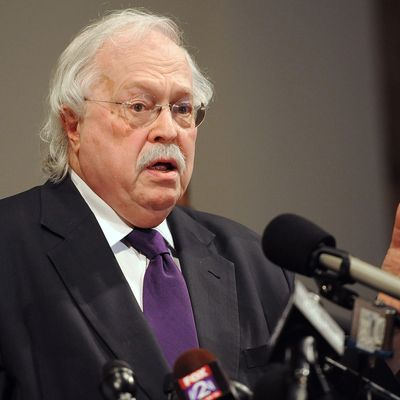
The August death of Jeffrey Epstein in a New York City jail has been subject to all manner of conspiracy-minded speculation. The October 30 opinion of Michael Baden, the forensic pathologist hired by Epstein’s brother, that the manner of death “points to homicide rather than suicide,” contradicting the conclusion of the Office of Chief Medical Examiner, will almost certainly stoke further speculation that Epstein, awaiting trial on federal child-pornography charges, met with foul play.
Whether that speculation is warranted interested me far less than the 85-year-old man giving this dissenting opinion. Michael Baden has spent decades as the go-to freelance medical examiner on the media and lecture circuit. He testified at the trials of O.J. Simpson and Phil Spector (who had hired Baden’s second wife, Linda Kenney Baden, as his defense attorney). He has conducted private autopsies in the deaths of Michael Brown, Aaron Hernandez, Shannan Gilbert, and John Belushi. He’s been so frequent a guest on Fox News shows — including Fox and Friends, where he gave his Epstein opinion — that he was identified as “Death Correspondent” on the long-running late-night show RedEye.
Hold Dr. Baden’s credentials up to the light, though, and a more checkered history emerges from his demi-celebrity status. I first sensed the disconnect between Baden’s fame (which he loved to discuss) and his accomplishments (which paled in comparison to his fame-chasing) when he gave a guest lecture at John Jay College’s forensic-science program while I was in graduate school there in the early 2000s. Self-aggrandizement, however irritating, is not necessarily an indication of professional unreliability. The circumstances of his dismissal as chief medical examiner for the New York City office in 1979, and again from running the Suffolk County office in 1982, are bigger — and more worrying — red flags.
Baden had been promoted to acting chief of the Office of Chief Medical Examiner in August 1978, after more than a decade as its deputy. He replaced Dominick DiMaio, who after four years in the job had been involuntarily retired on his 65th birthday by Mayor Ed Koch. DiMaio, previously running the Brooklyn M.E.’s office, had had to fill the gargantuan shoes of Milton Helpern, whose legend over two decades as chief medical examiner (and four decades of employment) had grown such that after his 1977 death, the building was named for him. Now DiMaio was out, and as a spokesperson for the mayor told the Daily News in April, when the successor was announced: “[Koch] had known Dr. Baden since 1966 and has found him to be very capable and innovative.”
It took exactly one year for Koch’s high opinion of Baden to sour. Too many unforced errors added up, including picked-apart trial testimony in the “Dr. X” case, leading to the acquittal of Mario Jascalevich in a spate of poison-murders at Riverdell Hospital; a Housing Authority patrolman whose January 1979 murder went undetected for 12 hours, his body removed from the scene before a proper death investigation; conflicting conclusions relating to the chokehold death of a Brooklyn businessman at the hands of police; and off-the-cuff comments about the possibly sexual-intercourse-interrupting death of Governor Nelson Rockefeller. Not even a high-profile gig as supervising pathologist for the House Select Committee on Assassinations, which looked anew at the JFK and Martin Luther King Jr. cases, could save Baden from the chopping block.
Ultimately, memos from district attorney Robert Morgenthau and city health commissioner Reinaldo Ferrer, documenting their criticism of Baden for “sloppy record keeping, poor judgment, and a lack of cooperation,” were the final straw. (Morgenthau later stated that Baden was “cavalier and uncooperative” with respect to evidence lost by the OCME.) Koch demoted Baden in August 1979, replacing him with Elliot Gross. Vowing to fight so-called political pressure, Baden sued for unlawful termination and was briefly reinstated as chief medical examiner in early 1980. That reinstatement was short-lived, with the lawsuit verdict was overturned by a higher court.
Baden moved on to Suffolk County, where he was appointed chief deputy medical examiner. Less than a year after his appointment, in December 1982, Baden was dismissed after an article in Oui magazine quoted him giving “advice on how to kill people” using undetectable poisons. Baden denied making the comments or even giving the interview at all; the Oui reporter later stated he took Baden’s words out of context, and the firing was rescinded, but the pathologist decided to leave Suffolk County and go out on his own.
Despite those inauspicious endings to his jobs in New York City and Suffolk County, Baden soon created enough work for himself to put his failures to the deep freeze. The success of his private forensic-pathology practice, the publication of his book Unnatural Death, and his hosting of HBO’s Autopsy vaulted him further up the expertise and punditry ladders. Repeated television appearances allowed Baden to center his opinions over the people whose autopsies he presided over as primary or secondary pathologist. It was surely sweet turnabout, too, when the man who replaced him at the OCME, Elliot Gross, ended up in even worse trouble than he had.
Baden’s onetime lawyer (and future best-selling crime novelist), Robert Tanenbaum, argued in 1979 that “he is too independent — that’s the only slam on the guy. He cannot be leaned on and he has tremendous integrity. And so in the mentality of the New York Establishment, he can’t be trusted.” In the real world, though, trust, however, is born from accomplishments more than from accolades. A thorny, high-stakes case like the death of Jeffrey Epstein demands unimpeachable integrity on the part of forensic-science professionals, rather than the entrails of long-ago fame. Which is why Michael Baden’s opinion on the matter is unreliable at best and dangerous at worst — a second opinion in dire need of a third one.





























